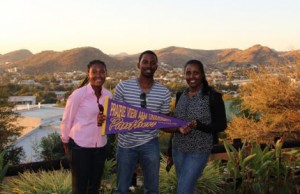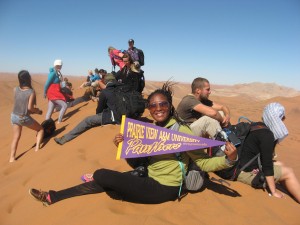 Wash A. Jones, assistant professor in the Department of Agriculture, Nutrition and Human Ecology, recently co-led the first half of a study abroad trip for 16 students to Namibia. The trip, funded primarily by a three-year research grant from the United States Department of Agriculture’s National Institute of Food and Agriculture, was a joint venture between Texas A&M University (TAMU), Prairie View A&M University (PVAMU), the University of Namibia (UNAM) and the Desert Research Foundation of Namibia (DRFN).
Wash A. Jones, assistant professor in the Department of Agriculture, Nutrition and Human Ecology, recently co-led the first half of a study abroad trip for 16 students to Namibia. The trip, funded primarily by a three-year research grant from the United States Department of Agriculture’s National Institute of Food and Agriculture, was a joint venture between Texas A&M University (TAMU), Prairie View A&M University (PVAMU), the University of Namibia (UNAM) and the Desert Research Foundation of Namibia (DRFN).
PVAMU students were Fitsum Abuye, senior agriculture major with a concentration in agricultural economics, Conlee Fry, senior agriculture major with a concentration in animal science, and Jasper Ross, junior psychology major. During the trip, students participated in six semester credit hours of TAMU coursework by completing a photography course and a cultural pluralism course. Travel dates for the thirteen students from TAMU and three students from PVAMU were July 10 – Aug 10. The four program leaders/course instructors each participated in one half of the trip (July 10 – July 25 or July 24 – August 10).
Scheduled activities for the students included class discussions and experiential learning activities related to food security, community-based natural resource management, career competencies, photography and cultural pluralism. Following are several major concepts and issues the students addressed or learned regarding Namibia:
- Namibia is the driest country in sub-Saharan Africa and only 2% of the land receives enough rain annually for agricultural purposes.
- The country does not have any formal nutrition education program, so malnutrition is a huge concern.
- Namibia’s public health system is extremely poor due to bad administration since the country’s independence from South Africa in 1990.
- Polygamy is common and is not illegal.
- The rate of HIV is as high as one in three persons in some parts of the country.
- Although affirmative action for the empowerment of females, Blacks and disabled individuals is a government policy, women typically are oppressed and have no say even though they are represented in leadership roles.
- Much corruption exists in the government. The Namibian State House (the President’s home), cost 10% of the national budget and was built by North Korea with no Namibian labor and no Namibian citizens’ input into the decision or process.
 Although this was an academic endeavor, wherein participants normally were engaged daily from 7:00 a.m. until about 9:00 p.m., trip participants challenged themselves by hiking up to and across the summit of the approximately 1100-feet high sand dune known as “Big Daddy,” one of the highest sand dunes in the world, and across a second set of dunes which was not as challenging. Additionally, they competed in volleyball with staff at the Gobabeb Desert Research Center. Incidentally, the Texas group was undefeated even though the Gobabeb team previously had been undefeated by visitors.
Although this was an academic endeavor, wherein participants normally were engaged daily from 7:00 a.m. until about 9:00 p.m., trip participants challenged themselves by hiking up to and across the summit of the approximately 1100-feet high sand dune known as “Big Daddy,” one of the highest sand dunes in the world, and across a second set of dunes which was not as challenging. Additionally, they competed in volleyball with staff at the Gobabeb Desert Research Center. Incidentally, the Texas group was undefeated even though the Gobabeb team previously had been undefeated by visitors.
During a tour of the capital city of Windhoek, the group visited Katutura, one of the poorest areas of Namibia which incidentally is adjacent to the well-developed city of Windhoek. Most residents in the Katutura area live in one-room tin houses, which they construct wherever they find a vacant space. Unfortunately, most of the residents have little chance of moving beyond these conditions.
The group visited the Topnaar tribe in the Namib Desert. This group has lived in that area for centuries, and their livelihood consists primarily of goat, cattle or sheep farming. Their homes lack electricity, running water and bathroom facilities and typically are built with tree bark, tin and tree limbs. Although their standard of living, compared to most people in the United States, is very meager, they appear to be a very contented and close-knit society.
When asked what she would change about her world, one elderly woman in the tribe said, “As long as we have goats, what more could we ask for?”
That response definitely was a defining moment for everyone in the group and provided them a different perspective on life.
This was Jones’ second trip to Namibia. He said he truly enjoyed the trip and is looking forward to next year’s trip. One goal is to increase the number of PVAMU students participating in the trip to at least 10.
The three PVAMU students offer the following statements to encourage other students to consider participating in this and similar opportunities in the future:
Conlee Fry: “Dream all you want of the wonders of the world or the countries that contain them, but I urge you to, one day, stop dreaming and go.”
Fitsum Abuye: “Studying abroad has helped me become global minded.”
Jasper Ross: “You never know what’s on the other side of the world unless you see it through your own eyes. Namibia…. A life changing experience.”
By Wash Jones, Ph.D.
Assistant Professor, College of Agriculture and Human Sciences
Visit us online at www.pvamu.edu/cahs
